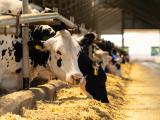Apr 2, 2004 (CIDRAP News) – US officials this week proposed that the World Organization for Animal Health (OIE) be called on to help resolve the US trade dispute with Japan over bovine spongiform encephalopathy (BSE). But Japan, to the chagrin of US officials, reportedly plans to reject the proposal.
Japan wants all US cattle to be tested for BSE before it will lift its current ban on imports of American beef. The ban was imposed after the first American BSE case was discovered in December.
In a Mar 29 letter to Japanese authorities, US Agriculture Secretary Ann Veneman proposed a joint American-Japanese technical consultation with the OIE to address scientific issues related to the import ban. But ensuing news reports from Japan said Yoshiyuki Kamei, Japan's agriculture minister, planned to reject the idea.
In response, Veneman and US Trade Representative Robert B. Zoellick expressed dismay in a statement issued yesterday. "We are disappointed that the Japanese response to our proposal was conveyed through the press instead of engaging in constructive dialogue about the merits of the proposal," they wrote. The statement again urged Japan to agree to a consultation with the OIE.
In the Mar 29 letter, Veneman proposed that the United States and Japan agree on a list of defined questions to pose to a panel of OIE experts. She recommended that the panel be asked to determine the appropriate laboratory definition of a BSE case, with reference to the relative importance of screening and confirmatory tests. She also suggested that the panel be asked to define "specified risk materials"—cattle tissues most likely to carry BSE infectivity—in light of the risk levels in the United States and Japan.
"Our agreement on these items should improve public confidence in our food safety systems and provide a basis for the resumption of trade," Veneman wrote.
In their statement reacting to reports that Japan would reject the US proposal, Veneman and Zoellick said Japanese authorities "have continued to insist" on testing of all cattle and removal of SRMs as conditions for lifting the beef import ban.
"International experts, as noted in the recent report of the international scientific panel that reviewed the U.S. system, agree there is no scientific basis for 100% testing," the statement continued. "The most appropriate path at this point is for the scientific experts at the OIE to consult and agree upon measures that are based on science."
The OIE would be willing to follow an "aggressive timetable" in addressing the issue, Veneman and Zoellick wrote. They added, "We have submitted our system and measures to scrutiny by international experts and see no reason why Japan should be reluctant to do likewise."
The US Department of Agriculture announced plans Mar 15 to expand BSE testing from about 20,000 cattle last year to 200,000 or more this year. The department promised to test as many as possible of the estimated 446,000 cattle considered to be at increased risk for BSE, though this would still be a small fraction of all the cattle slaughtered each year.
Japan began testing all its cattle for the disease after the first Japanese case was discovered in 2001. Japan has had 11 BSE cases so far, according to the OIE.




















